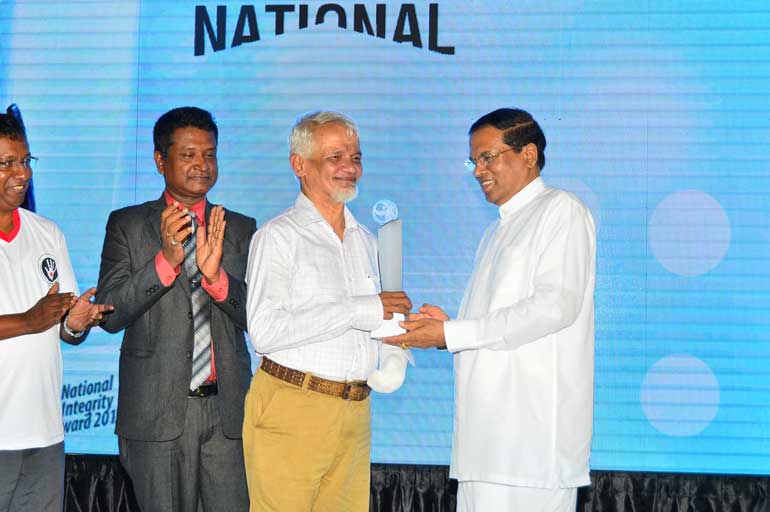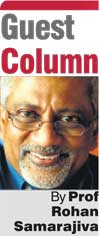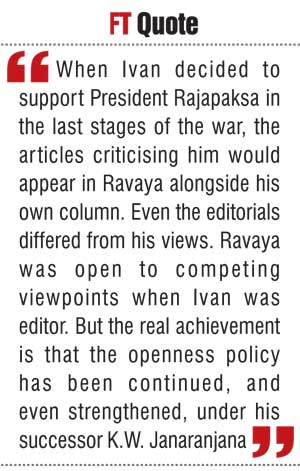Friday Feb 20, 2026
Friday Feb 20, 2026
Monday, 21 December 2015 00:00 - - {{hitsCtrl.values.hits}}
 President Maithripala Sirisena presents the award to Victor Ivan given by Transparency International Sri Lanka
President Maithripala Sirisena presents the award to Victor Ivan given by Transparency International Sri Lanka
The founding editor of Ravaya, Victor Ivan, was honoured by Transparency International Sri Lanka recently. In a curious turn of events, this triggered assaults on his character and his career. He is more than capable of defending himself, so I will not rise to his defence. But I’d like to say a few things in his praise.
It is our custom to assess the achievements of a man or woman upon their demise. But it is more productive to society and more satisfying (or not) to the person concerned if this is done while the person is still alive. The academic equivalent of this assessment is the publication of a festschrift, a volume of celebratory writing by those whose intellectual pursuits have been shaped by the honouree.
Framing the constitutional debate
I believe Victor Ivan is Sri Lanka’s preeminent public intellectual. He, more than anyone else, is responsible for shaping the contemporary discourse of constitutional reform. For the longest time, he kept pointing to the executive presidency as the root cause of all the ills in our society. His perseverance over the years has paid off.
I do not fully agree with his diagnosis. My conclusion is that an executive presidency, subject to the right kinds of checks and balances, including an independent judiciary and an empowered legislature and provinces, is the optimal solution for a country at our stage of development and with our multi-ethnic character.
I disagree with Ivan’s analysis, but as one who seeks to shape public policy through ideas, I cannot but admire his achievement.
Public policy is not about the achievement of first-best solutions, but about the avoidance of the worst outcomes. Those of us who did not engage Ivan at the right time on the merits of a system of government based on division of powers must now focus on achieving the second - or third-best solutions and avoiding the worst possible outcomes.

Critic of supreme injustice
When I returned to Sri Lanka in 2002, I heard talk of impeaching the Chief Justice. In light of the delicate balancing act needed to sustain divided Government and the need to build consensus around the peace negotiations, I thought this was a bad idea.
I was not completely wrong. Within days of a submission of an impeachment motion, the then President took over three Ministries, the action that led to the calling of fresh elections in 2004. But I was wrong in a more fundamental way, as I admitted in an article published on 7 June 2009 on the happy occasion of the end of Sarath Silva’s tenure as Chief Justice:
“That was before Anthony Fernando was arbitrarily thrown into jail for contempt causing me to read Victor Ivan. I was wrong, but I was not the prime minister.
Victor Ivan, the brave critic of supreme injustice, likes to point to the 1978 Constitution as the source of all evil. With all due respect, the Silva saga belies that thesis. That selectively enforced document did not cause this devastation. This was the result of a short-term, self-serving and ultimately self-destructive sin of commission by a former president, a sin of omission by a former prime minister, spineless complicity by the legal profession, and servile silence by the rest (Victor Ivan, Anthony Fernando, Deshamanya R.K.W. Goonesekera and a few others excepted)”.
The recent film by Prasanna Vithanage documents Ivan’s achievements in exposing judicial corruption beyond Sarath Silva. What is puzzling is that his principled and courageous actions have not caused the miscreants, including the former Chief Justice, any negative consequences. What is sad is that these people are still interviewed by the media on matters of national importance.
Journalistic innovation
I write in Ravaya. My book in Sinhala on economic strategies appropriate for us was published by Ravaya in 2012. My writing significantly deviates from the approach adopted by a majority of those who write for Ravaya, and possibly a majority of its readers. Yet, there is room for me on the platform Ivan built.
This openness is not limited to writing on economic subjects. When Ivan decided to support President Rajapaksa in the last stages of the war, the articles criticising him would appear in Ravaya alongside his own column. Even the editorials differed from his views.
Ravaya was open to competing viewpoints when Ivan was editor. But the real achievement is that the openness policy has been continued, and even strengthened, under his successor K.W. Janaranjana.
This shows that Ivan succeeded in embedding certain values in the working culture of his newspaper. For that, as well as his achievement in successfully handing over the leadership of his newspaper, Ivan deserves another award.